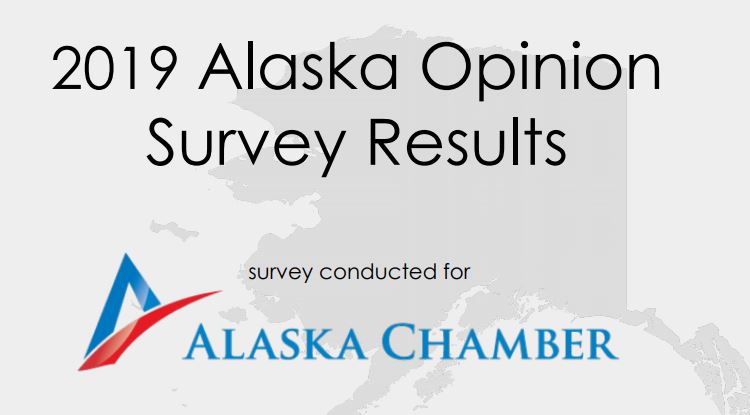
The less time you’ve lived in Alaska, the more optimistic you may be about the current state of affairs.
This is according to a Dittman Research poll sponsored by the Alaska Chamber of Commerce.
Kati Capozzi has been the CEO of the state chamber since April of this year. She spoke to the Sitka chamber last week (7-31-19).

Capozzi was on a whistlestop tour of Southeast, discussing the results of the chamber’s annual Dittman poll, and its lengthy list of legislative priorities.
Number 1 out of 54 priorities, Capozzi told her Sitka membership, is supporting the reduction of state spending to sustainable levels. But she said the chamber had no official position on Gov. Dunleavy’s recent vetoes of over $400 million from the state budget.
Capozzi explained: “The concern among the broader business community — you know we have more than 700 members and I’m pretty sure that means we have more than 700 different opinions on the vetoes — on how and where the money should be spent…is that if we don’t get our spending in order, that eventually we’re going to keep arguing over which pot of money we use to pay for the government, and eventually the government will turn to business and say ‘We’ve run out, now pay up.’”
Other top legislative priorities for the state chamber cover the spectrum of political opinion. For example: The chamber supports alternative certification for Alaska seafood — and also supports overturning the Tongass Roadless Rule.
Capozzi said that any member can offer an advocacy position at the group’s annual policy forum each fall, and the membership at large will review it and vote on it. And every member gets one vote, regardless of whether they are Conoco-Phillips corporation, or a mom-and-pop retailer.
Capozzi also walked the Sitka chamber through the results of the annual Dittman poll — research sponsored by the state chamber, but written to be impartial. 705 “likely voters” were polled in March, 41-percent of them in the Anchorage area; 13-percent in Southeast.
The results were unsurprising in most respects: For instance, 64-percent of Alaskans feel the state is on the wrong track. But Capozzi said new arrivals tended to buck that trend.
“People who’ve lived in Alaska nine years or less are way more optimistic — about everything!” Capozzi said. (audience laughter) “About a gas line, they’re more optimistic about the state of the economy, the direction of the state — they’re just very optimistic people.”
The poll didn’t ask whether or not Alaskans want to pay an income tax to support state government. Instead, it asked whether voters should approve an income tax before it is implemented. The results there were among the highest in the poll — with 75-percent of respondents in the affirmative. There were also high numbers in support of constitutional protection of the Permanent Fund, and for requiring able-bodied Medicaid recipients to work in order to receive benefits.
Trending down, however, was support of oil exploration in the Arctic National Wildlife Refuge — a drop of 10 percentage points over 15 years.
“We also see a lot of the issue here isn’t that people aren’t supportive of development,” she said. “It’s just that we haven’t been talking about ANWR for close to a decade now. It hasn’t been on the table, there was no chance of accessing it. So we haven’t been spending our time and our money talking about ANWR. Now that it is back on the table, and it’s getting a lot of attention, we expect to see this number creep up.”
Under the Trump administration, the Bureau of Land Management proposed offering up to 1 million acres of the refuge for oil leasing.
Capozzi told the Sitka chamber that her approach was to ignore those most in favor or most opposed to a certain issue, and focus on moving the middle. And she has experience doing just that: Last year Capozzi worked as the campaign manager for Stand for Alaska, the organization created to oppose Ballot Measure 1, known as “Stand for Salmon.” Stand for Alaska targeted undecided voters, and defeated Prop 1 soundly, 61 to 39 percent.






























